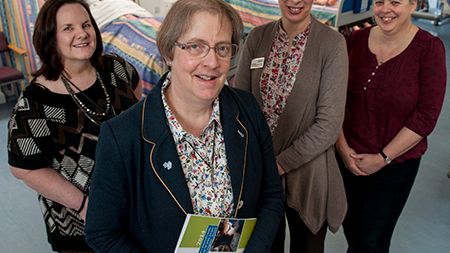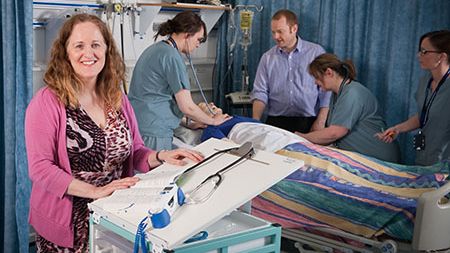
Press release -
NHS lung transplant patients fare better than publicly-insured Americans
British cystic fibrosis patients who receive lung transplants fare significantly better in the long-term than Americans with either public or private health care insurance according to a new study published today (Tuesday 24 March).
Stephen Clark, Professor of Cardiothoracic Surgery at Northumbria University and Director of Heart and Lung Transplantation at Newcastle’s Freeman Hospital, conducted the study with NHS colleagues and researchers from Baltimore’s Johns Hopkins Medicine. They analysed the medical records of more than 2,700 people with cystic fibrosis who had undergone transplant surgery in the UK and United States.
Their analysis, which is published today in the American Journal of Transplantation and will be presented later this week at the annual meeting of the Society for Cardiothoracic Surgery in Manchester, reveals that US patients on Medicaid or Medicare public insurance had overall poorer survival rates when compared with privately insured fellow Americans and UK patients operated on by the National Health Service.
Cystic fibrosis is a genetic disorder that affects about 10,000 people in the UK and 70,000 people worldwide. It stems from the body’s inability to ferry chloride in and out of cells and is marked by the build-up of thick, sticky mucus in the lungs, causing frequent infections, chronic inflammation, tissue damage and premature death. Lung transplantation is an option of last resort for those with end-stage lung disease.
The investigators compared records detailing survival and death in cystic fibrosis patients aged 12 and above who underwent lung or combined heart-lung transplantation in the United States or the United Kingdom between 2000 and 2011.
Of the 2,307 US patients in the study, 39% (894) had publicly funded health insurance through Medicare or Medicaid. All of the UK patients were treated by the National Health Service.
There was little difference between US and UK patients in the immediate aftermath of the surgery – between a month and three months following the operation – but a marked difference emerged over the long run.
The average survival following transplantation was 8.1 years among UK patients, 7.9 years among privately insured Americans and 4.7 years among publically insured Americans.
The differences persisted even after researchers accounted for the influence of factors known to affect survival, including age, overall health and the condition of a patient’s lungs leading up to transplantation.
Professor Stephen Clark said: “The National Health Services’ lung transplant programme equals the top-notch care achieved under American private insurance and outperforms care received by publicly insured Americans.
“The results of the study underscore the ability of publicly funded health care systems to achieve excellent results in complex transplant surgery, and this is something we are rather proud of.”
Ashish Shah, M.D., Associate Professor of Surgery and Surgical Director for Heart and Lung Transplantation at Johns Hopkins, said: “Our results indicate that the United Kingdom’s national public health system outperforms its US equivalent, and given that a significant portion of Americans rely on publicly funded insurance for their medical coverage, we, as a country, ought to have an honest conversation about the reasons behind this disparity and find ways to close the gap.”
The researchers emphasise that their study did not look into the specific causes of the difference in survival rates but say their findings warrant a careful look into the factors driving the gap if it is to be eliminated.
“Lung transplantation is among the most complex procedures performed today, one that requires a wealth of resources and careful long-term management by multiple specialists, and as such remains an imperfect therapy,” Shah added.
“So it is paramount that we pinpoint and eliminate any systemic factors that interfere with its success.”
Although previous studies have examined country-by-country variations in such health indicators as infant mortality, women’s health, cancer therapy and cardiac care, the researchers say theirs is the first international comparison of lung transplant outcomes in patients with cystic fibrosis.
Jessica Jones, Policy Adviser for the Cystic Fibrosis Trust, said: “We are delighted to see the NHS recognised as a world leader in post-lung transplant survival, and are proud that people with cystic fibrosis can expect the best treatment when matched to available donor lungs.
“This study reinforces our desire to see the NHS work to ensure more people benefit from the world-class skills and innovation of our national lung transplant programme. Tragically one in three people with cystic fibrosis on the lung transplant list still die before they are called for the procedure. That is why the Cystic Fibrosis Trust is working to significantly improve the rate of safe and effective lung transplantations in the UK.”
The researchers say their findings suggest that a single-payer national health care system can provide complex, coordinated and expansive care, and attain long-term outcomes similar to those achieved by private health insurance.
“One of the popular criticisms of a single-payer health system has been the fear of scarcity of resources and rationing that may lead to suboptimal care,” says Christian Merlo, M.D., M.P.H., a pulmonary and critical care specialist, assistant professor of medicine at the Johns Hopkins University School of Medicine and lead author of the study.
“The comparable outcomes between lung transplant patients with public health insurance in the UK and their privately insured US counterparts indicate this fear may be unfounded or largely exaggerated.”
The research team included Helen Thomas, Nizar Yonan, Debra Thomas, Andre Simon and Richard Thompson in the UK and George Arnaoutakis and Jonathan Orens of Johns Hopkins University School of Medicine.
Categories
Northumbria is a research-rich, business-focussed, professional university with a global reputation for academic excellence. To find out more about our courses go towww.northumbria.ac.uk
If you have a media enquiry please contact our Media and Communications team at media.communications@northumbria.ac.uk or call 0191 227 4571.











